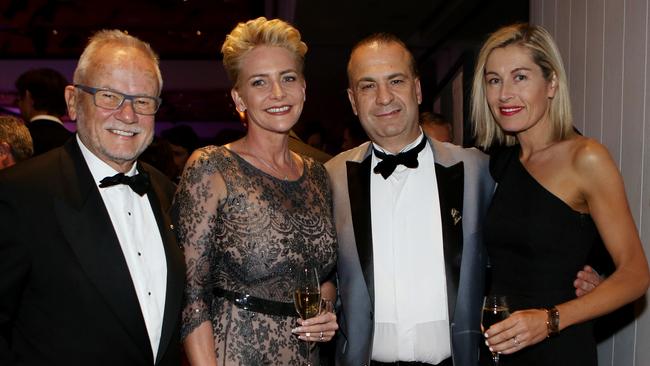$100m windfall comes blowing in from Everest
It is the $100m horse race that has 40,000 flocking to Royal Randwick on Saturday.

It is the $100m horse race that has 40,000 people flocking to Royal Randwick on Saturday, helping pack hotels and restaurants across Sydney, and is already proving to be a profitable venture for the owners of the 12 competing thoroughbreds.
The Everest is set to inject about $100m into the NSW economy through consumer spending, prizemoney, ticket sales, hotel room rates, sponsorship, betting, broadcast fees and corporate hospitality.
The racecourse’s $150m grandstand has proven so popular with the business set that The Estate, featuring two high-end precincts costing $1500 per head and including a Guillaume Brahimi menu, has been created.
The exclusive Chairman’s Club and Grandview Restaurant have sold out, with 800 people playing $300-$500 each, while six corporate boxes on level two — one owned by John Singleton, another by John Camilleri’s Steggles — and a further 18 on level four, costing tens of thousands annually, will also be full.
Sponsors such as The Star’s Matt Bekier, NSW Premier Gladys Berejiklian and media executives are expected in the Director’s Room run by Racing NSW boss Peter V’landys. Other big names, such as Gerry Harvey, are also expected at the track.
The business of being part of The Everest is also proving to be lucrative for owners of the 12 “slots” in the world’s richest turf race — it has $14m in prizemoney — who have paid $1.8m for the right to enter for three years.
Slot owner Max Whitby, a derivatives trader and larger-than-life King Cross character who could personify the term “colourful racing identity”, reckons the investment he and Black Caviar owners Neil Werrett and Colin Madden made before the first Everest in 2017 has been sound.
“You look at it being worth $600,000 each year, but there’s demand for them at $800,000 to $850,000 now, I reckon,” Mr Whitby said. “And you’ll see the prizemoney going higher next year, to $15m, and up from there, so those slots will end up being worth more, though I’m not sure even little blokes like us would sell them on. I mean, what’s an extra $200,000 or so between friends?”
Mr Whitby and his group are racing Sunlight on Saturday and he has high hopes for the horse, which if it wins or places well will mean a big payday.
He says he broke even in the first two years of the race.
With The Everest prizemoney set to reach $20m within a few years, it is realistic that Mr Whitby’s slot could be worth $1m by then. But at current levels the slots as investment are up 20-25 per cent since 2017, a very good return in a low interest rate environment.
Slot owner Greg Ingham of GTI Racing has rumoured to have accepted a $750,000 bid for his $600,000 slot for this year only, which is now held by the Melbourne Racing Club — which hosts the $5m Caulfield Cup on Saturday. “He (Ingham) is making money even though he is not in the race,” a source says.
Other slot owners include Tabcorp, The Star casino and a collection of other mostly racing-focused owners, including the Godolphin stable owned by Dubai ruler Mohammed bin Rashid Al Maktoum, and others such as Chinese billionaire Zhang Yue Sheng and his Hong Kong counterpart Tony Fung.
Deals have been done between the slot holders and the actual horse owners, who will split prizemoney roughly equally.
One owner is Larry Kestelman, property developer and owner of the National Basketball League who is a member of The List — Australia’s Richest 250.
He has a small stake in Yes Yes Yes, racing in the slot held by Chris Waller of Winx fame, and will attend Randwick for the first time. “I probably own a hoof in the horse when you look at it,” Mr Kestelman says. “But when you look at the money on offer, even owning a hoof can be quite lucrative.”




To join the conversation, please log in. Don't have an account? Register
Join the conversation, you are commenting as Logout